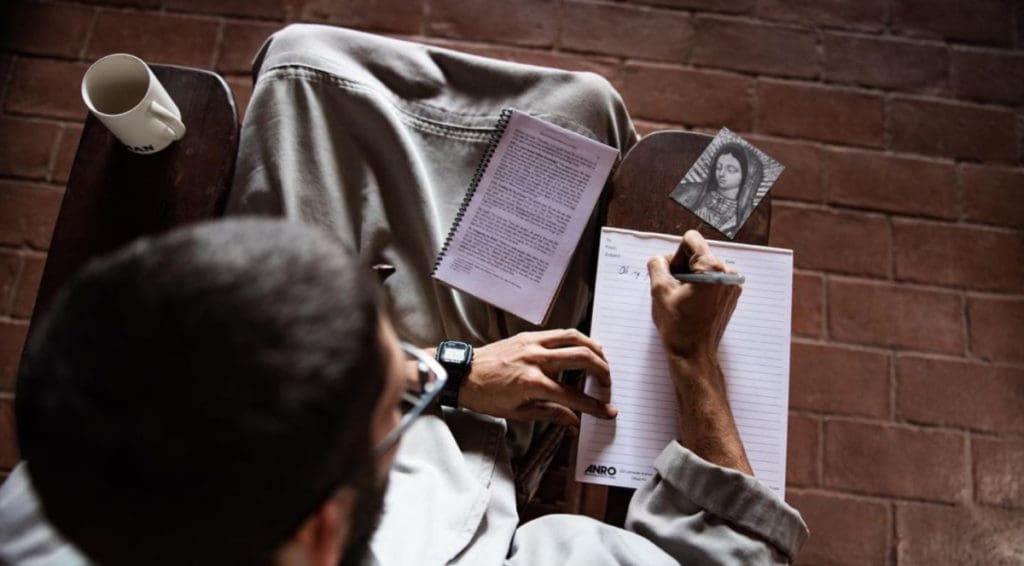Dear Brian,
Your last letter affected me greatly. I am sorry to hear of your recent struggles with anxiety and how paralyzing it is for you at times. To say that this is a heavy cross would be an understatement! Of all the things you have shared with me over the years, this seems to be the most challenging and difficult cross you have had to carry. Let me begin by expressing how sorry I am that you are going through this! Needless to say, I will continue to pray for you, especially as you attempt to navigate through this dark cloud.
Unfortunately, or maybe fortunately in this situation, anxiety is something I have known firsthand. When I was a teenager I struggled a lot with anxiety for several years. At times it was so paralyzing that I honestly didn’t know how I would make it through the day. For me, the root cause of anxiety was a deep feeling of inadequacy before life. I felt incompetent before everything, whether it was school, sports, or deciding what to do with my future. Since I believed that I couldn’t do anything, I became anxious before life. Thankfully, I can honestly say that the weight of this cross has been lifted a bit, yet at times it still rears its ugly head.
What I would like to share with you in this letter are merely some thoughts about developing a “spirituality towards anxiety.” I am not a psychologist and have very little training in psychology, therefore I am unqualified to speak to you as a psychologist or counselor. Without denying the importance of psychology and the other social sciences, I can only speak to you, Brian, as a fellow disciple and one who has struggled in this area as well. With this in mind, let me begin.
Jesus tells us in the Gospel, “Do not be anxious about your life…Look at the birds of the air: they neither sow nor reap nor gather into barns and yet your heavenly Father feeds them. Are you not of more value than they? And which of you by being anxious can add one cubit to his span of life”(Matthew 6:25-26). These powerful words of Jesus have both challenged me and consoled me over the years. It is important to recognize that Jesus is not telling us to ignore our life, or that our feelings, sufferings, and trials are irrelevant. Rather, Jesus is reminding each one of us that, despite what we may experience in life, we are known, loved, and being held in the Father’s arms every moment of our life.
Your first reaction to this may be one of disbelief. “Every moment of my life I am being held in the Father’s arms? What about this situation, or this painful memory, or this circumstance, you may ask? Where was God then?” These are good and honest questions that one must ask. However, they require not merely human reasoning and analysis, but deep prayer and reflection. Yet before we even begin to ask such questions we must remember an essential characteristic about God: His greatest answers to our questions often come not through his words, but through his presence.
The Crucifixion of Jesus reveals this most profoundly I believe. On the cross, Jesus experienced in his own humanity our feelings of being abandoned and forgotten by God. His cry, “My God, my God, why hast thou forsaken me?” (Mk 15:34) has been echoed throughout history by countless people who have suffered, causing many to lose faith in a God who knows us, loves us, and sustains us every moment of our life. Yet, what does the crucifixion reveal to us? Not the absence of God, but the overwhelming presence of God! Do we not believe that on Good Friday, the most dreadful day in human history, God the Father was present shining his light, love and mercy through such apparent darkness?
Salvation, much to our astonishment, does not come when everything and everyone is perfect, but when everything, quite honestly, is at its worst!
The point I am attempting to make is simply this: there is more to reality than what we can see or feel. Whether we are struggling with anxiety, addiction, loneliness, etc, it would be wrong to interrupt these challenging circumstances as proof of God’s absence. St. Paul tells us, “Rejoice in the Lord always…and “have no anxiety about anything” (Philippians 4:4-6). St Paul, as you know, was a man who had much to be anxious about. However, like Jesus, he is not telling us to ignore our anxiety or that it doesn’t really exist, but rather he is reminding us that there is more beyond it. What ultimately is beyond our anxiety? The presence of God who, though we cannot always perceive it, is loving us and sustaining us every moment of our existence.
One of the reasons this is so difficult for us is because we tend to believe the stories anxiety (or any struggle we are dealing with) would like us to believe. For example, because of your recent struggles with anxiety you are now questioning God’s love for you, the validity of your prayer life, and whether or not you should even go on retreat next month. Where do these thoughts come from?
Doubting God’s love, your relationship with him and the opportunity for greater intimacy through a week-long retreat cannot be the voice of God. Each one of these thoughts contradicts exactly what Jesus says! They are the result, not of listening to God’s word, but of listening to the lies that anxiety would like you to believe.
What each one of us needs to do is stop drawing conclusions based primarily on our thoughts and feelings, especially when our thoughts and feelings do not coincide with the reality that Jesus reveals. We automatically assume that if we are thinking or feeling something, it must be true. However, in this case, each one of your thoughts and feelings has led to a false conclusion. Why? Because anxiety has tricked you to believe that you are anxiety. What Jesus reveals about you is that you are a child of God first and foremost, who merely struggles with anxiety.
We must not, of course, repress or ignore our thoughts and feelings, however, we cannot give them the authority and power to tell us who we are. It is one thing to say, ‘I feel anxious or I feel inadequate,” and quite another to say, “I am anxious, or I am inadequate.” Unfortunately, I have spent many years living as the person anxiety has told me I am as opposed to the person Jesus has told me I am. Despite my own poverty and sins and all the trials and struggles I have faced in my life, the Lord continually reminds me that I am none of these things. When I ask him who I am, his response is always the same, “Jeremiah, you are my son.” I pray that God will continue to remind you of the same!
You have asked me if I think you need counseling. A general rule I was always told is that one should seek counseling when a particular issue is preventing them from fully participating in life, whether that occurs in one’s work, family or relationships. Personally, I am convinced that most people, at some point in their life, could benefit from counseling. There are many ways to encounter God’s grace and counseling has proven to be an avenue of grace for many people. If you do decide to seek it out, it is nothing to be ashamed of. Rather, your courage and determination to confront this issue is a sign that you are one step closer to freedom. In the meantime, be assured of my prayers for you.
Sincerely in Christ,
Fr. Jeremiah
This post was first published on From the Friars and is reprinted here with permission.
Photo courtesy of the Community of the Franciscan Friars of the Renewal and @martin.jernberg.




